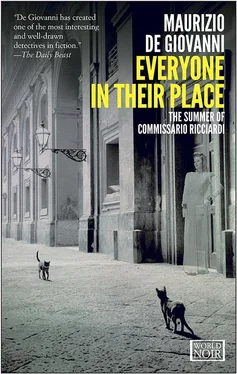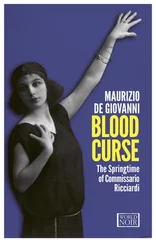Maurizio de Giovanni - Everyone in Their Place
Здесь есть возможность читать онлайн «Maurizio de Giovanni - Everyone in Their Place» весь текст электронной книги совершенно бесплатно (целиком полную версию без сокращений). В некоторых случаях можно слушать аудио, скачать через торрент в формате fb2 и присутствует краткое содержание. Жанр: Исторический детектив, Полицейский детектив, на английском языке. Описание произведения, (предисловие) а так же отзывы посетителей доступны на портале библиотеки ЛибКат.
- Название:Everyone in Their Place
- Автор:
- Жанр:
- Год:неизвестен
- ISBN:нет данных
- Рейтинг книги:4 / 5. Голосов: 1
-
Избранное:Добавить в избранное
- Отзывы:
-
Ваша оценка:
- 80
- 1
- 2
- 3
- 4
- 5
Everyone in Their Place: краткое содержание, описание и аннотация
Предлагаем к чтению аннотацию, описание, краткое содержание или предисловие (зависит от того, что написал сам автор книги «Everyone in Their Place»). Если вы не нашли необходимую информацию о книге — напишите в комментариях, мы постараемся отыскать её.
Everyone in Their Place — читать онлайн бесплатно полную книгу (весь текст) целиком
Ниже представлен текст книги, разбитый по страницам. Система сохранения места последней прочитанной страницы, позволяет с удобством читать онлайн бесплатно книгу «Everyone in Their Place», без необходимости каждый раз заново искать на чём Вы остановились. Поставьте закладку, и сможете в любой момент перейти на страницу, на которой закончили чтение.
Интервал:
Закладка:
He hadn’t finished the sentence when there came a knock at the door. Through the half-open door, the hawk nose of Ardisio, the policeman manning the switchboard, appeared.
“Commissario, Brigadie’, forgive me. A call has come in from Santa Maria La Nova, someone’s found a corpse.”
Maione got up from his chair with a look of misery on his face.
“And just once, they could’ve let us be. Of course, Commissa’, if someone actually decides to invite trouble in. .”
Ricciardi had already thrown on his jacket.
“Don’t try to be funny, and let’s do our best not to be superstitious, at least in here. Ardisio, send for a photographer and the medical examiner, see if Dr. Modo’s in, give him the address, and ask him to join us there. You, Maione, get a couple of uniformed men: who’s on duty?”
The sun was high in the sky by now, and it was taking no prisoners. The part of the piazza in front of City Hall not shaded by the crowns of the holm oaks was deserted, except for the occasional automobile which drove through without stopping. The few pedestrians sought the shade of the taller buildings, such as the Teatro Mercadante or the Hotel de Londres, even if it meant walking an extra two hundred yards. No noise came from the port, either, except for the quiet lapping of the waves.
The mobile squad usually moved on foot, given the chronic shortage of motorized vehicles. But their destination wasn’t far away and by now, according to the information taken down by Ardisio over the telephone, whatever may have happened was over-there was no longer anything to put a stop to. Ricciardi knew perfectly well that without being there himself there wasn’t much hope of keeping the crime scene intact; in a city where everyone spent their lives peering into other people’s business, no one would admit to having seen a thing, but they’d all do their best to help by moving objects, gathering evidence, and fiddling with corpses. So they might as well arrive with calm deliberation and in considerable force, to gather as much information as possible according to the particular procedure required by Ricciardi.
To reach Piazza Santa Maria La Nova they had to take Via Emanuele Filiberto di Savoia, which the populace who never read the marble plaques bearing the street names continued to call Via Medina, the name it had had for centuries. The shaded part of the street ran alongside ancient and aristocratic palazzi, behind which unfolded a tangle of narrow alleys running down to the waterfront. The population of these lanes, which were dark even in broad daylight, was ignored by the census takers, didn’t know how to read and write, and lived like so many mice, according to codes unknown to the law.
As the team led by Ricciardi and consisting of a huffing and puffing Maione and the two uniformed cops, Camarda and Cesarano, moved slowly by, you could see shadows moving frantically in the narrow passageways between the buildings to conceal whatever business they had in hand.
The other side of the street, in the harsh bright wash of sunlight, was deserted. Or almost. Ricciardi saw the image of a dead man standing outside a large street door. He remembered the case: the corpse had been found one morning a few months back, beaten to death by fists and feet and some blunt object, perhaps a club. The killer, or more likely, the killers, had worked the victim over for a long time. Incredibly, though perhaps it wasn’t all that unbelievable given the times they lived in, the family hadn’t filed a criminal complaint, claiming that the man had simply fallen down; as if it were possible to fall from a standing position and split your forehead open like a watermelon. But, as the deputy chief of police had commented as he signed the order for the police to drop the case, if two family members, a brother and a cousin, were both present and gave eyewitness testimony to that effect, there was little point to investigating further. Cimmino, Ricciardi’s senior colleague who was assigned to the case, had been happy to go along with Dottor Garzo’s instructions, both to please his boss and because the dead man, who was unemployed, also had a reputation as an anti-Fascist activist.
Now, as he walked hastily through a veil of heat that made the façades of the buildings shimmer, Ricciardi saw the man standing motionless, vivid, his face swollen with bruises, his shattered forehead dripping blood into his eyes, his teeth broken. From his mouth, a black gash in the middle of his face, came an infinite litany, an endless repetition of a single phrase, surprisingly clear:
“Buffoonish clowns, you’re nothing but four buffoonish clowns. Four to one, for shame, for shame, you buffoonish clowns.”
They reached their destination just as the church bells were summoning the faithful to the nine o’clock mass. The little piazza still showed the signs of the festivities that had taken place there the night before, with a heap of burned wood in the center of the square and crumpled paper littering every corner. Ricciardi shot Maione a quizzical glance, and he explained:
“It was the festa of Santa Maria Regina, Commissa’. It’s a tradition, this is the month for the festas. Look at that, all the brown paper cones, what those scoundrels must have gobbled up last night!”
Directly across from the church was the front door of an ancient aristocratic palazzo. It was obvious that the crime had taken place there: if nothing else, from the small murmuring crowd that had gathered there awaiting news, as was customary. The church bell went on ringing but no one was moving off to mass. Mass, after all, was said every Sunday, while a murder was much rarer. Perhaps.
The arrival of the police sent a shiver of discomfort and curiosity through the mass of people; everyone wanted to see what would happen, and everyone had something to hide. Maione went first, pushing his way roughly through the crowd.
The front door stood slightly ajar. On the threshold, screening the interior from intrusive eyes, stood a little man in livery. As soon as he saw Maione coming, he greeted him with relief.
“At last, at last, please, come right in, this is where the horrible thing happened.”
His voice was shrill, almost feminine; from the midst of the crowd a young man imitated it mockingly and here and there people laughed. The man seemed not to notice: from under his oversized hat, which settled down around the crown of his head until it rested on the base of his nose, he was sweating profusely. He looked upset. Maione asked him:
“And who are you?”
The man stood to attention and snapped a salute that in any other context would have been comical.
“Giuseppe Sciarra, at your service, Brigadie’, building doorman, in the employ of their graces, the Duke and Duchess of Musso di Camparino.”
The effect of the pompous introduction was spoiled by the ridiculous high-pitched voice, once again promptly mocked by the anonymous comedian in the crowd who set off another round of laughter, this time more widespread. Maione spun around with an angry glare:
“So we think it’s funny, eh? Then let’s see who wants to come down to police headquarters and do their laughing there. Camarda, take some first and last names in that crowd, I’m really feeling like having a laugh myself. And I laugh hardest when I see someone crying.”
A worried silence fell and a few people backed away. Ricciardi spoke to the little man.
“I’m Commissario Ricciardi. Let us through.”
Sciarra doffed his hat, uncovering a thinning head of hair and to some extent emphasizing the prominence of the nose that practically filled his face.
“Come right in, Commissa’, if you please; in the courtyard you’ll find my wife, the maid, and the housekeeper, and they’ll show you to the place where. . where it happened, that is. I’ll stay here and make sure no one gets in.”
Читать дальшеИнтервал:
Закладка:
Похожие книги на «Everyone in Their Place»
Представляем Вашему вниманию похожие книги на «Everyone in Their Place» списком для выбора. Мы отобрали схожую по названию и смыслу литературу в надежде предоставить читателям больше вариантов отыскать новые, интересные, ещё непрочитанные произведения.
Обсуждение, отзывы о книге «Everyone in Their Place» и просто собственные мнения читателей. Оставьте ваши комментарии, напишите, что Вы думаете о произведении, его смысле или главных героях. Укажите что конкретно понравилось, а что нет, и почему Вы так считаете.












